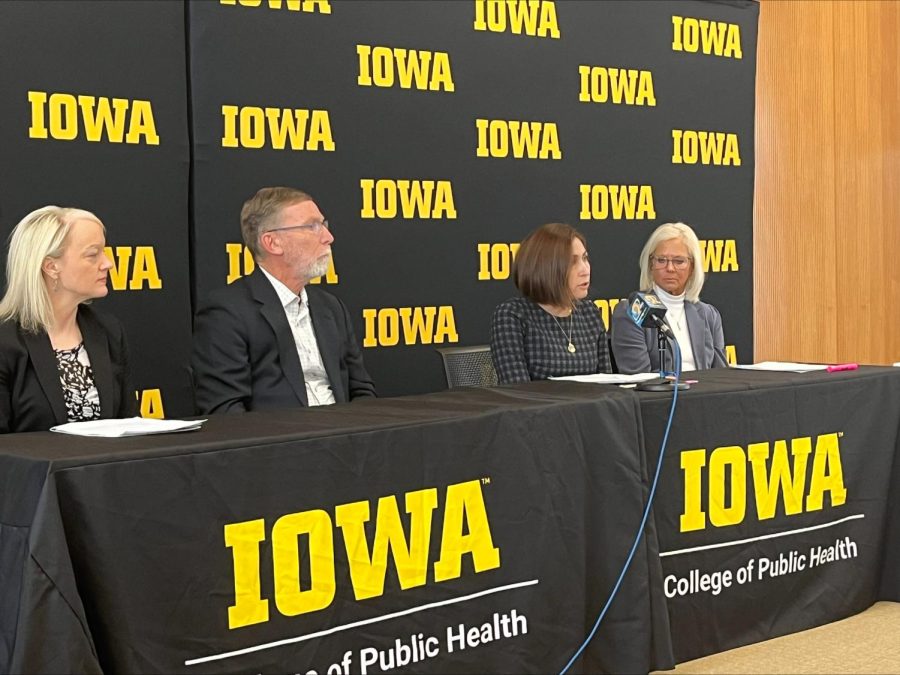Iowa cancer report shows decreased mortality rates, increased incidence rates
While many positive developments have been made in various forms of cancer in the state, a worrying increase in new cancer cases has concerned medical experts.
Speakers of the Iowa Cancer Registry talk at the College of Public Health Building on Feb. 28, 2023. The Iowa Cancer Registry marks 50 years of servicing Iowans.
February 28, 2023
Cancer mortality rates in the state have decreased and overall cancer survival rates increased in Iowa, a report from the Iowa Cancer Registry revealed.
The Iowa Cancer Registry released its annual Cancer in Iowa Report on Tuesday, highlighting the progress made in the state since the report’s foundation 50 years ago and the work that still needs to be done.
Mary Charlton, University of Iowa associate professor of epidemiology and director of the Iowa Cancer Registry/State Health Registry of Iowa, said on Tuesday that Iowa is second in the nation in overall cancer incidence. Cancer incidence is defined as the number of new cancer cases reported in a specific area over a year.
Iowa is also the only state in the nation with a significant increase in cancer incidence from 2015 to 2019, the period in which the most recent data is available for this topic.
Charlton said experts are not sure exactly why Iowa has had a growing cancer incidence rate in recent years compared to surrounding states that have not seen as much growth in this area as Iowa. She added there could be many potential explanations, such as high state-wide alcohol consumption rates, physical inactivity, and unhealthy diets.
“There’s no smoking gun or something really exciting that we can do,” Charlton said. “I think it’s just a lot of things collectively that we need to do as a population.”
In addition to this issue, another concern Charlton pointed out from the report is inequities in cancer mortality and incidence rates in communities of color and rural communities.
George Weiner, UI director of the Holden Comprehensive Cancer Center, said the report’s data could help medical professionals in the state recognize these issues so they can try to fix them.
“That’s where data such as the data from the registry really comes in,” Weiner said. “It can help us identify what we’re doing well, what we’re not doing well, and that allows us to direct our resources to where they’re really needed, so that we can take the advances that we’ve made in our research laboratories and our clinics and make sure everybody can benefit from it.”
Charlton said the five-year breast cancer survival rate in the state is now 90 percent for all stages combined, and this is because of more people getting mammograms and screenings and improvements in treatment.
Ingrid Lizarraga, a UI Hospitals and Clinics breast surgeon and American College of Surgeons Commission on Cancer State Chair for Iowa, said while this is a great development, women still need to make sure they are getting regular mammograms as early detection is a major factor in survival rates.
Also present at the media availability Tuesday was retired teacher from Hudson Community School District and breast cancer survivor Diane Anderson, who spoke on her involvement in the recent investigation in a potential cancer cluster at her former school district.
While the results of the investigation were inconclusive, Anderson said she is still grateful for the team of researchers at the UI who looked into the situation and helped her beat breast cancer. She added she plans to continue to listen to the concerns of her community and report them back to the research team.
“I cannot praise this team of researchers enough. This has helped raise awareness and encourage proactivity with all types of cancer,” Anderson said. “Their work has proven to be so important within our cancer community, which I am now a part of. Cancer is becoming much too common, and we need to put the brakes on it.”















